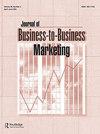The Reference Group as Antecedent of Gray Market Participation: An Empirical Analysis
IF 2.5
4区 管理学
Q3 BUSINESS
引用次数: 0
Abstract
ABSTRACT Purpose The objective of this research is to analyze the motivation of a distributor belonging to an official marketing channel to participate in the gray market. We explore this motivation not as an opportunistic behavior but as a strategic decision aligned with the reference group to which it belongs and the homogenization or isomorphism of strategic decisions within the group. Methodology/Approach Based on a survey of a sample of Spanish official distributors of Fast-Moving Consumer Goods (FMCG) and an empirical study using PLS-SEM, found evidence that the imitation effect conditions strategic decisions and can be graduated according to the hierarchical position occupied or legitimacy within the reference group. Findings The hypothesized model was supported by the data. This indicates that the reference group influences the agents that make it up and determines the actions expected of its members, offering a tool to the manufacturer or brand owner to manage the official distribution channel. Originality/Value The investigation of the effect of the reference group on the behavior of the official distributor offers an alternative to the classical explanation of its participation in the gray market, which has not been addressed by the academic literature so far, and which has traditionally been explained by the individual opportunism of the agents. Practical implications The main managerial implication is to provide a monitoring element to the official distribution channel leader, such as influencing the behaviors of the reference group to efficiently manage the marketing channel.参考群体作为灰色市场参与的前因:实证分析
摘要目的分析某官方营销渠道经销商参与灰色市场的动机。我们不是将这种动机视为机会主义行为,而是将其视为与其所属参考群体一致的战略决策,以及该群体内战略决策的同质化或同构性。基于对西班牙快速消费品(FMCG)官方分销商样本的调查和使用PLS-SEM的实证研究,发现模仿效应条件战略决策的证据,可以根据参考组内所占据的等级地位或合法性进行分级。结果数据支持假设模型。这表明参考群体影响着组成该群体的代理商,并决定其成员的预期行为,为制造商或品牌所有者提供了管理官方分销渠道的工具。对参考群体对官方经销商行为影响的调查,为其参与灰色市场的经典解释提供了另一种选择,迄今为止,学术文献尚未解决这一问题,传统上被解释为代理人的个人机会主义。主要的管理意义是为官方分销渠道领导者提供一个监控元素,例如影响参考群体的行为,以有效地管理营销渠道。
本文章由计算机程序翻译,如有差异,请以英文原文为准。
求助全文
约1分钟内获得全文
求助全文
来源期刊
CiteScore
2.20
自引率
35.70%
发文量
22
期刊介绍:
The Journal of Business-to-Business Marketing® encourages diversity in approaches to business marketing theory development, research methods, and managerial problem solving. An editorial board comprised of outstanding, internationally recognized scholars and practitioners ensures that the journal maintains impeccable standards of relevance and rigorous scholarship. The Journal of Business-to-Business Marketing features: •basic and applied research that reflects current business marketing theory, methodology, and practice •articles from leading researchers covering topics of mutual interest for the business and academic communities

 求助内容:
求助内容: 应助结果提醒方式:
应助结果提醒方式:


